Globalization, Migration and Family Diversity
Abstract
Until recently, there has been little dialogue between scholars who have been researching and theorizing about globalization and those working in the field of family studies. It is often said that globalization is affecting family patterns but the exact nature of that effect, is seldom fleshed out. Family diversity has also become a major theme in family sociology, but the link between it, and globalization is seldom discussed in any detail. The purpose of this paper is to make a modest attempt at bringing together discussions of globalization and family diversity.
In the first part, the author considers some of the reasons for this lack of dialogue between globalization and family researchers. In the second, she looks at how globalization has affected family patterns in Europe. Finally, family patterns in South Africa, are compared to those of one European country: Great Britain. One of the main arguments raised is that globalization has had a minimal impact on the family patterns found in individual European societies and that regional differences persist within the European context. However, it is unlikely that these differences are due to globalization. Another argument put forward is that family diversity pertains at the global level. This becomes apparent when the family patterns of an African and European society are compared.
Downloads
References
Bachofen, J. 1861. Mutterrecht (Matemal Law). In: Engels, F. Origin of the Family, Private Property and the State. 1902. Chicago: Charles H. Kerr & Company.
Elliot, F. 1986. The Family: Change or Continuity? London: MacMillan.
Elliot, F. 1996. Gender. Family andSociety. London: MacMillan.
Engels, F. 1902. Origin of the Family, Private Property andthe State. Chicago: Charles H. Kerr & Company.
European Commission. 200I. The Social Siluation in the European Union. Eurostat.
Giddens, A. 200 I. Sociology (Fourth Edition). Oxford: Polity Press.
Goode, W. 1963. The Family. Englewood Cliffs: Prentice Hall.
Goode, W. 1964. World Revolution andFamily Patterns. New York: The Free Press.
Hajnal, J. 1983. Two Kinds ofPre-industrial Household Formation System. In: Wall, R. et al. (eds.). Family Forms in Historic Europe. Cambridge: Cambridge University Press, pp. 65-104.
Haralambos, M. & Holbom, M. 1995. Sociology — Themes andPerspectives. London: Unwin Hyman.
Held, D. et al. 1999. Global Transformations. Oxford: Polity Press. In: Giddens, 2001. Sociology. Oxford: Polity Press.
Hochschild, A. 1997. The Time Bind. In: Giddens, 2001. Sociology. Oxford: Polity Press.
Kanter, R. 1977. Men and Women of the Corporation. New York: Basic Books.
Kertzer, D. 1991. Household History and Sociological Theory. Annual Review of So ciology, vol. 17, pp. 155-179.
Kertzer, D. & Laslett, P. (eds.). 1995. Aging in the Past - Demography, Society and Old Age. Berkeley: University of California Press.
Laslett, P. & Wall, R. (eds). 1972. Household and Family in Past Time, Cambridge: Cambridge University Press.
Le Play, F. 1871. L 'Organisation de la Famille. Paris: Tequi.
Macfarlane, A. 1978. The Origins of English Individualism. Oxford: Basil Black weil.
Maine, H. 1861. AncientLaw. London: Murray.
McLennan, D. 1886. Primitive Marriage (Studies in Ancient History). In: Engels, F. 1902. Origin ofthe Family, Private Property and the State. Chicago: Charles H. Kerr & Company.
McLennan, D. 1886. Primitive Marriage (Studies in Ancient History). In: Engels, F. 1902. Origin ofthe Family, Private Property and the State. Chicago: Charles H. Kerr & Company.
McLennan, D. 1886. Primitive Marriage (Studies in Ancient History). In: Engels, F. 1902. Origin ofthe Family, Private Property and the State. Chicago: Charles H. Kerr & Company.
McLennan, D. 1886. Primitive Marriage (Studies in Ancient History). In: Engels, F. 1902. Origin ofthe Family, Private Property and the State. Chicago: Charles H. Kerr & Company.
Shorter, E. 1975. The Making of the Modern Family. Glasgow: FontanaCollins.
Smith, J. & Wallerstein, I. 1992. Creating and Transforming Households. Cambridge: Cambridge University Press.
Smith, J. & Wallerstein, I. 1992. Creating and Transforming Households. Cambridge: Cambridge University Press.
Stone, L 1977. The Family, Sex and Marriage inEngland 1500-1800. London: Wieden feld & Nicholson.
Therbom, G. 2001. African Families in a Global Context. Paper delivered attheWorshop on Global Porcesses. Cape Town, November 29 - December 2, 2001.
Wall, R; Robin, J & Laslett, P. (eds). 1983. Family Forms in Historic Europe. Cam bridge: Cambridge University Press.
Ziehl, S .C. 1997. Family diversity-ASouthAfricanperspectivefocusingon Whites in Grahamstown. Unpublished doctoral thesis, Rhodes University, Grahamstown.
Ziehl, S .C. 1997. Family diversity-ASouthAfricanperspectivefocusingon Whites in Grahamstown. Unpublished doctoral thesis, Rhodes University, Grahamstown.
Downloads
Published
How to Cite
Issue
Section
License

This work is licensed under a Creative Commons Attribution-NonCommercial-NoDerivatives 4.0 International License.
Authors guarantee that the work is their own original creation and does not infringe any statutory or common-law copyright or any proprietary right of any third party. In case of claims by third parties, authors commit their self to defend the interests of the publisher, and shall cover any potential costs.
More in: Submission chapter





